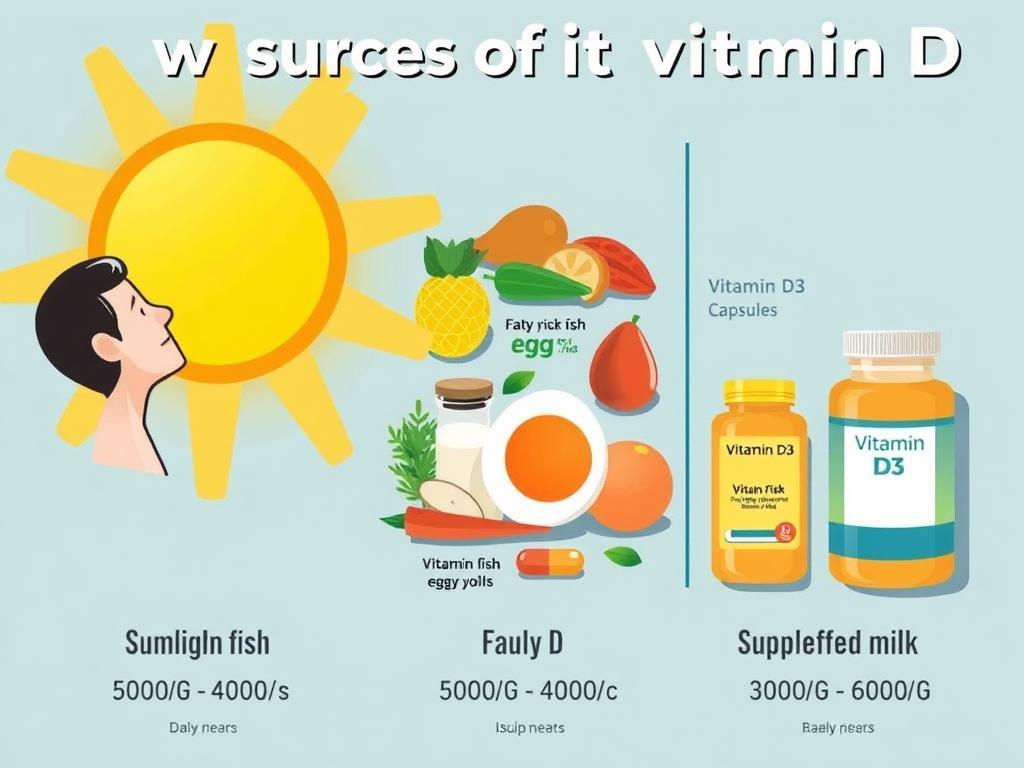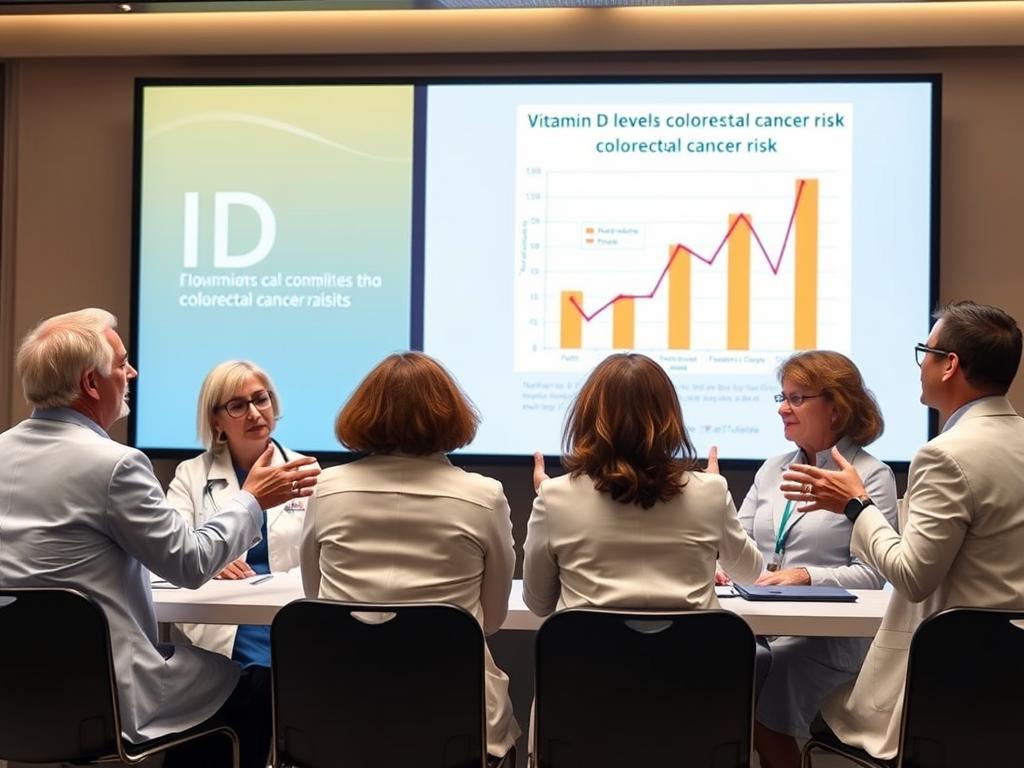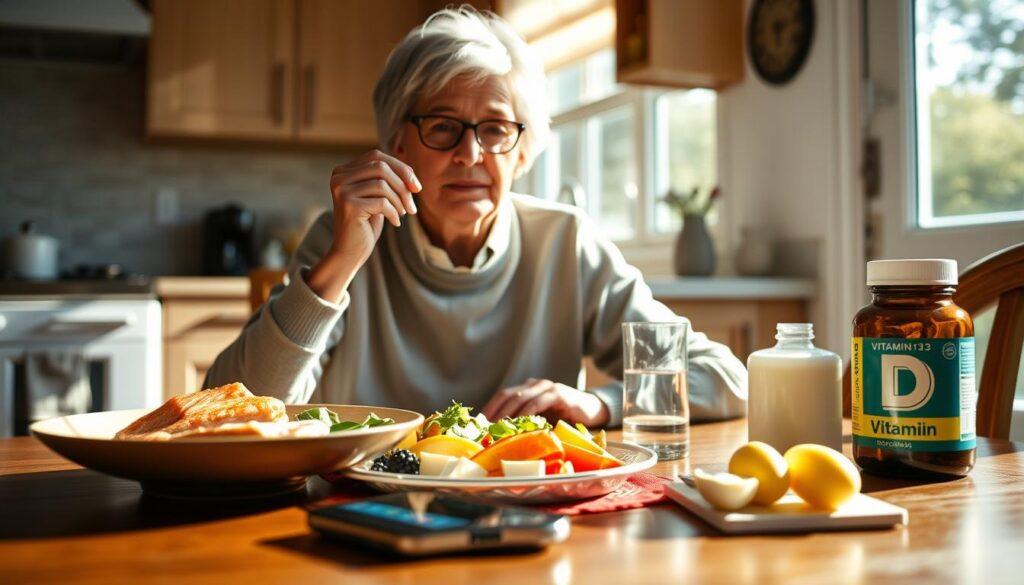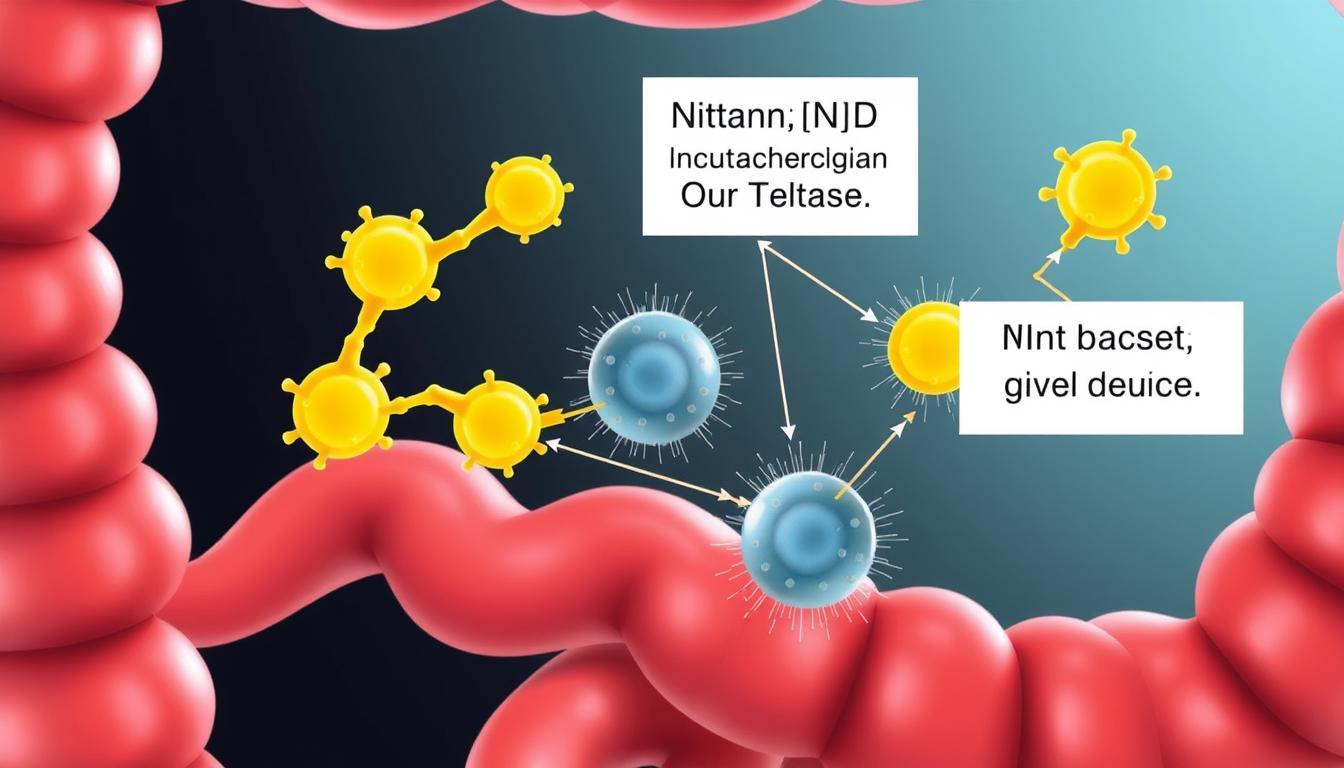A groundbreaking new study has revealed that adequate vitamin D levels may reduce colorectal cancer risk by up to 58%, offering new hope in the fight against one of the most common and deadly cancers worldwide. This comprehensive research adds to the growing body of evidence suggesting vitamin D plays a crucial role in cancer prevention, particularly for colorectal cancer. In this article, we’ll explore the mechanisms behind this protective effect, optimal vitamin D intake recommendations, and practical strategies to ensure you’re getting enough of this essential nutrient.
Key Findings: How Vitamin D Fights Colorectal Cancer
Vitamin D interacts with colorectal cells to inhibit cancer development through multiple pathways
The recent study, published in the Journal of Clinical Oncology, analyzed data from over 5,000 participants and found that individuals with optimal vitamin D levels had a 58% lower risk of developing colorectal cancer compared to those with vitamin D deficiency. This striking finding has significant implications for public health, especially considering that colorectal cancer is the third most common cancer worldwide.
Multiple Protective Mechanisms
Researchers identified several key mechanisms through which vitamin D provides protection against colorectal cancer:
Immune System Regulation
Vitamin D plays a crucial role in modulating the immune system, which is essential for identifying and eliminating abnormal cells before they can develop into cancer. The study found that vitamin D enhances the function of immune cells that target cancer cells, particularly in the intestinal tract where vitamin D receptors are highly expressed.
Anti-Inflammatory Effects
Chronic inflammation is a known risk factor for colorectal cancer. Vitamin D has potent anti-inflammatory properties, reducing the production of pro-inflammatory cytokines and inhibiting inflammatory pathways that can promote cancer development. The research demonstrated that participants with higher vitamin D levels had significantly lower markers of intestinal inflammation.
Cell Growth Regulation
Vitamin D helps regulate the cell cycle, promoting the differentiation of cells and preventing the uncontrolled growth characteristic of cancer. It induces cell cycle arrest through upregulation of p21 and p27, important cell cycle inhibitors. The study showed that vitamin D supplementation increased the expression of these protective proteins in colorectal tissue.
Wnt Signaling Inhibition
The Wnt signaling pathway is abnormally activated in over 90% of colorectal cancers. Vitamin D has been shown to inhibit this pathway through multiple mechanisms, including sequestration of β-catenin and induction of DKK1, an endogenous Wnt inhibitor. The research confirmed that vitamin D supplementation reduced markers of Wnt pathway activation in study participants.
“What’s particularly exciting about this research is that it identifies multiple mechanisms through which vitamin D protects against colorectal cancer. It’s not just one pathway—vitamin D works through several complementary processes to reduce cancer risk,” explains Dr. Michael Holick, professor of medicine at Boston University School of Medicine and a leading vitamin D researcher.
Recommended Vitamin D Intake for Cancer Prevention

The three main sources of vitamin D: sunlight, diet, and supplements
Based on the study findings and current medical consensus, researchers have outlined specific recommendations for vitamin D intake to help reduce colorectal cancer risk:
| Source | Recommended Amount | Notes |
| Sunlight | 10-30 minutes of midday sun exposure, 2-3 times per week | Depends on skin tone, latitude, season, and time of day. Darker skin requires more exposure. |
| Diet | 600-800 IU daily from food sources | Difficult to achieve through diet alone. Best sources include fatty fish, egg yolks, and fortified foods. |
| Supplements | 1,000-4,000 IU daily | Dosage should be personalized based on baseline levels, age, weight, and health conditions. |
| Total Daily Intake | 1,500-4,000 IU for most adults | The study found that participants who maintained blood levels of 30-50 ng/mL had the greatest cancer risk reduction. |
Not Sure About Your Vitamin D Levels?
Knowing your current vitamin D status is the first step toward optimizing your levels for cancer prevention. Speak with your healthcare provider about getting your vitamin D levels tested.
Age-Specific Recommendations
The study also highlighted that vitamin D needs vary by age, with older adults requiring higher intake due to decreased skin synthesis and absorption:
- Adults under 50: 1,500-2,000 IU daily
- Adults 50-70: 2,000-3,000 IU daily
- Adults over 70: 3,000-4,000 IU daily
- Individuals with obesity: May require 2-3 times higher doses due to sequestration in adipose tissue
- Individuals with dark skin: May require 1.5-2 times higher doses due to reduced skin synthesis
“The evidence suggests that maintaining blood levels of 25-hydroxyvitamin D between 30-50 ng/mL provides optimal protection against colorectal cancer. For most people, this requires a daily intake of 2,000-4,000 IU, which is well within the safe range for supplementation.”
Geographic and Seasonal Variations
Latitude Effect
Populations living at higher latitudes (further from the equator) typically have lower vitamin D levels due to reduced UVB exposure, especially during winter months. The research found that colorectal cancer rates were 30-50% higher in regions above 37° latitude compared to equatorial regions, correlating strongly with average population vitamin D levels.
Seasonal Patterns
The study identified a seasonal pattern in colorectal cancer diagnosis, with higher rates of advanced-stage diagnoses occurring in late winter and early spring—when vitamin D levels typically reach their annual low point. This seasonal variation was most pronounced in regions with significant seasonal changes in UVB exposure.
Ethnic and Racial Disparities
Significant disparities in colorectal cancer rates exist between different ethnic and racial groups, which correlate with vitamin D status. The research found that populations with darker skin (who synthesize less vitamin D from sun exposure) had both lower average vitamin D levels and higher colorectal cancer rates. African Americans had a 40% higher incidence of colorectal cancer compared to Caucasians, with average vitamin D levels 15-20 ng/mL lower.
Socioeconomic Factors
The study also examined socioeconomic factors affecting vitamin D status and cancer rates. Indoor workers, urban dwellers, and those with limited access to vitamin D-rich foods all showed higher rates of deficiency and correspondingly higher colorectal cancer incidence.
Key Statistical Findings
“The correlation between vitamin D status and colorectal cancer risk is remarkably consistent across different populations and geographic regions. When we control for other risk factors like diet, physical activity, and screening rates, vitamin D emerges as an independent protective factor with significant impact.”
Expert Perspectives on Vitamin D and Colorectal Cancer

Medical experts discussing the implications of vitamin D research for colorectal cancer prevention
Leading oncologists and nutritionists have weighed in on the study findings, offering their perspectives on the clinical implications for colorectal cancer prevention:
Dr. Sarah Chen, Oncologist
“This research provides compelling evidence that vitamin D supplementation should be considered as part of a comprehensive approach to colorectal cancer prevention. For my patients at average risk, I now discuss vitamin D status alongside traditional screening recommendations. For those with elevated risk factors or a family history of colorectal cancer, optimizing vitamin D levels becomes even more important.”
Dr. Robert Johnson, Gastroenterologist
“What’s particularly valuable about this study is that it shows benefit even in patients who already have precancerous polyps. We found that adequate vitamin D levels were associated with a 30% reduction in polyp recurrence after removal. This suggests vitamin D may be beneficial not just for primary prevention but also for preventing progression from polyps to cancer.”
Lisa Martinez, RD, Nutritionist
“From a nutritional perspective, this research reinforces the importance of a holistic approach. While supplements may be necessary for many people, I encourage patients to also focus on dietary sources of vitamin D and safe sun exposure. The anti-cancer benefits appear to be strongest when vitamin D comes from a combination of these sources rather than from supplements alone.”
“What makes this study particularly compelling is that it shows benefit across the entire spectrum of colorectal cancer development—from initial cellular changes to polyp formation to invasive cancer. This suggests vitamin D acts at multiple stages of carcinogenesis, making it a versatile preventive agent.”
Clinical Recommendations from Experts
Based on the study findings, experts have outlined specific recommendations for healthcare providers and patients:
For Healthcare Providers
- Screen for vitamin D deficiency in all patients at average or elevated risk for colorectal cancer
- Target serum 25-hydroxyvitamin D levels of 30-50 ng/mL for optimal cancer prevention
- Consider higher supplementation doses for patients with risk factors for deficiency
- Monitor levels every 6-12 months, especially after initiating supplementation
- Discuss vitamin D as part of routine colorectal cancer prevention counseling
For Patients
- Request vitamin D testing as part of regular health screenings
- Discuss supplementation with healthcare providers if levels are below 30 ng/mL
- Combine supplementation with dietary sources and safe sun exposure
- Be consistent with supplementation, as benefits appear to require sustained optimal levels
- Continue regular colorectal cancer screening according to guidelines
Practical Tips to Optimize Your Vitamin D Levels

Practical strategies for optimizing vitamin D levels through sunlight, diet, and supplements
Based on the study findings and expert recommendations, here are practical strategies to help you maintain optimal vitamin D levels for colorectal cancer prevention:
Sunlight Exposure
Safe Sun Practices
- Aim for 10-30 minutes of midday sun exposure 2-3 times weekly
- Expose arms, legs, or back without sunscreen initially (for vitamin D production)
- Darker skin tones may need 3-5 times longer exposure
- After vitamin D production time, apply sunscreen to prevent skin damage
- Avoid sunburn, which increases skin cancer risk
Seasonal Adjustments
- Increase supplementation during winter months, especially above 37° latitude
- Consider using a UVB lamp during winter if approved by your healthcare provider
- Track your shadow length—when your shadow is shorter than your height, UVB rays are strong enough for vitamin D production
- Keep a vitamin D journal to track exposure, supplements, and seasonal changes
Dietary Sources

Top dietary sources of vitamin D include fatty fish, egg yolks, mushrooms, and fortified foods
| Food Source | Vitamin D Content (IU) | Serving Size |
| Wild-caught salmon | 600-1,000 | 3 oz (85g) |
| Farmed salmon | 100-250 | 3 oz (85g) |
| Canned tuna | 150-200 | 3 oz (85g) |
| Sardines | 250-300 | 3 oz (85g) |
| Egg yolk | 40-50 | 1 large egg |
| UV-exposed mushrooms | 400-700 | 3 oz (85g) |
| Fortified milk | 100-150 | 1 cup (240ml) |
| Fortified orange juice | 100 | 1 cup (240ml) |
| Cod liver oil | 400-1,000 | 1 tablespoon |
Need Help Planning a Vitamin D-Rich Diet?
Creating a diet rich in vitamin D can be challenging. Consult with a registered dietitian for personalized guidance on incorporating these foods into your meal plan.
Supplementation Strategies
Choosing the Right Supplement
- Form: Vitamin D3 (cholecalciferol) is more effective than D2 (ergocalciferol)
- Dosage: Start with 1,000-2,000 IU daily if levels are unknown
- Timing: Take with meals containing fat for better absorption
- Combination: Products with vitamin K2 may offer additional benefits
- Quality: Choose USP-verified or third-party tested supplements
Monitoring and Adjusting
- Test baseline levels before starting supplementation
- Retest after 3 months of consistent supplementation
- Adjust dosage based on test results to achieve 30-50 ng/mL
- Consider higher doses initially if severely deficient (<10 ng/mL)
- Maintain with appropriate dose once optimal levels are reached

Consulting with a healthcare provider is essential for personalized vitamin D supplementation
“When it comes to vitamin D supplementation, personalization is key. Factors like body weight, skin tone, age, geographic location, and existing health conditions all affect how much supplementation an individual needs. That’s why testing is so important—it takes the guesswork out of dosing.”
Study Limitations and Future Research Directions

Ongoing research continues to investigate the relationship between vitamin D and colorectal cancer
While the study provides compelling evidence for vitamin D’s role in colorectal cancer prevention, the researchers acknowledged several limitations and areas for future investigation:
Study Limitations
Study Strengths
- Large sample size (over 5,000 participants)
- Long follow-up period (median 8.5 years)
- Comprehensive assessment of vitamin D from all sources
- Adjustment for multiple confounding factors
- Consistent findings across different subgroups
- Biological mechanisms supported by laboratory studies
Study Limitations
- Observational components limit causal inference
- Potential unmeasured confounding factors
- Vitamin D levels measured at baseline only in some participants
- Genetic factors affecting vitamin D metabolism not fully assessed
- Optimal dosing for different populations not definitively established
- Interaction with other nutrients (calcium, magnesium) not fully explored
Future Research Directions
The researchers outlined several key areas for future investigation to further clarify vitamin D’s role in colorectal cancer prevention:
Personalized Dosing
Future studies will focus on developing personalized dosing algorithms that account for individual factors such as genetics, body composition, age, and baseline vitamin D status. This precision medicine approach aims to optimize the cancer-preventive benefits while minimizing potential risks of excessive supplementation.
Genetic Interactions
Emerging research suggests that genetic variations in vitamin D metabolism and signaling pathways may influence an individual’s response to supplementation. Large-scale genetic studies are underway to identify specific genetic markers that predict who will benefit most from vitamin D supplementation for cancer prevention.
Combination Approaches
Researchers are investigating whether combining vitamin D with other nutrients or medications may enhance its cancer-preventive effects. Preliminary data suggest synergistic effects when vitamin D is combined with calcium, marine omega-3 fatty acids, or certain anti-inflammatory agents.
Intervention Timing
Questions remain about the optimal timing of vitamin D intervention for maximum cancer prevention. Future studies will examine whether supplementation is most effective when started early in life, during middle age, or after precancerous changes have been detected.
“While this study provides strong evidence for vitamin D’s protective role, we still have important questions to answer. We need to better understand how genetic factors influence vitamin D’s effects, determine optimal dosing for different populations, and explore potential synergies with other nutrients. These are the focus of our ongoing research.”
Can vitamin D supplementation benefit patients who already have colorectal cancer?
Yes, emerging research suggests that vitamin D may improve outcomes in patients already diagnosed with colorectal cancer. Studies have found that higher vitamin D levels at diagnosis are associated with better survival rates and reduced risk of recurrence. Some clinical trials are now investigating whether vitamin D supplementation can enhance the effectiveness of conventional cancer treatments.
Is it possible to get too much vitamin D?
Yes, although vitamin D toxicity is rare, it can occur with excessive supplementation (typically above 10,000 IU daily for extended periods). Symptoms may include nausea, vomiting, weakness, and kidney problems. The study found that the benefits for colorectal cancer prevention were achieved at doses (1,000-4,000 IU daily) well below the threshold for toxicity. It’s important to work with a healthcare provider to determine the appropriate dose and monitor levels periodically.
How long does it take for vitamin D supplementation to reduce cancer risk?
The study found that consistent supplementation for at least 2-3 years was associated with the greatest risk reduction. However, some benefits were observed after just one year of maintaining optimal levels. The researchers emphasized that vitamin D supplementation should be viewed as a long-term strategy for cancer prevention rather than a short-term intervention.
Conclusion: A Promising Strategy for Colorectal Cancer Prevention

Taking a proactive approach to colorectal cancer prevention through vitamin D optimization
The groundbreaking study on vitamin D and colorectal cancer risk provides compelling evidence that maintaining optimal vitamin D levels may be one of the most effective strategies for reducing your risk of this common and deadly cancer. With a potential risk reduction of up to 58%, vitamin D supplementation represents a simple, affordable, and accessible intervention that could save thousands of lives annually.
The multiple protective mechanisms identified—from immune system enhancement and anti-inflammatory effects to cell cycle regulation and Wnt signaling inhibition—explain why vitamin D appears to be so effective at preventing colorectal cancer at various stages of development. While no single intervention can eliminate cancer risk entirely, the evidence suggests that vitamin D optimization should be a cornerstone of any comprehensive cancer prevention strategy.
As research continues to refine our understanding of optimal dosing, genetic factors, and potential synergies with other nutrients, the fundamental message remains clear: checking your vitamin D levels and addressing any deficiency is a prudent step toward reducing your colorectal cancer risk. Combined with regular screening, a healthy diet, physical activity, and other lifestyle modifications, vitamin D represents a powerful tool in the fight against one of our most prevalent cancers.
Take Action for Your Colorectal Health Today
Don’t wait to optimize your vitamin D levels. Speak with your healthcare provider about testing your current levels and developing a personalized supplementation plan based on your individual needs.
“The evidence for vitamin D’s protective effect against colorectal cancer is now robust enough that it should be part of the conversation in every primary care and gastroenterology office. This is a rare opportunity in medicine—a simple, low-cost intervention with minimal side effects that could potentially prevent thousands of cancer cases each year.”



